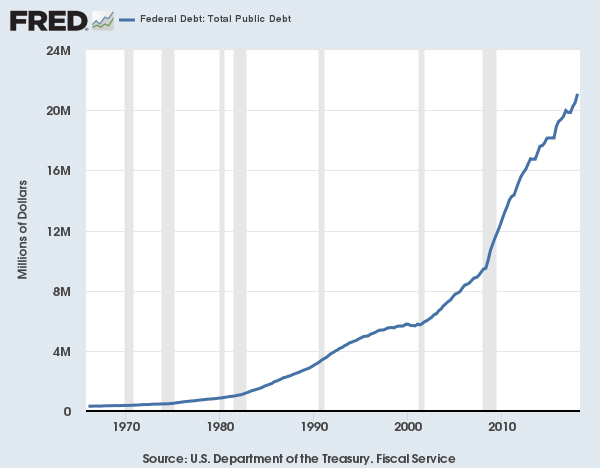Republican lawmakers used to claim they wanted to reduce government spending and start chipping away at federal debt. And they said it with such passion and conviction, you’d be forgiven for believing them.
But when Republicans controlled both Congress and the White House between 2001 and 2006*, total federal debt rose from $5.77 trillion to $8.85 trillion, or a little over $3 trillion in six years.
The spending was so bad that even Democrats started complaining and began pointing out that the last time the federal budget was balanced was under a Democrat, President Bill Clinton. Voters apparently wondered “How much worse can it get?” and put Barack Obama in the White House with a Democratic Congress.
Then voters found out how much worse it could get.
Federal debt rose from $11.13 trillion in the first quarter of 2009 to $19.98 trillion in the last quarter of 2016. That represented an increase of just over $1 trillion additional debt each year Obama was in office.

Republicans and conservatives used the exploding federal debt as yet another example of Obama’s failures and promised to do better.
Well, voters gave them that opportunity. However, since January 2017, federal debt has risen from $19.85 trillion to $21.09 trillion, or about $1.24 trillion in 18 months. That’s only a slightly slower growth rate than Obama’s—and we aren’t in a recession.
To be sure, there are political hurdles to cutting spending. Senate Republicans are shy of the 60 votes they need to get a budget passed without Democratic support, so some concessions have to be made.
But it’s not like Republicans are even trying. With respect to the $1.3 trillion omnibus spending package that President Trump signed in March the Heritage Foundation opined, “Rather than being cut, reformed, or eliminated, programs that are wasteful, inefficient, or inappropriate will receive tens of billions of dollars in additional funding.”
It appears that Republicans have largely given up on cutting federal spending. These days, they only want to talk about growing the economy, hinting that the increased revenues will help reduce federal deficits and the federal debt. But that would only be true IF Congress maintained current spending levels—or even let them grow by 1 percent a year or less.
Cutting federal spending and growing the economy aren’t mutually exclusive; in fact, they complement each other.
But there is no indication the Republican-led Congress wants to cut spending—except in campaign speeches.
*Except for a period from May 2001 through 2002 when Republican Senator Jim Jeffords became an Independent and voted with Senate Democrats.
